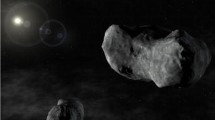Abstract
Primitive terrestrial life – defined as a chemical system able to transfer its molecular information via self-replication and to evolve – probably originated from the evolution of reduced organic molecules in liquid water. Several sources have been proposed for the prebiotic organic molecules: terrestrial primitive atmosphere (methane or carbon dioxide), deep-sea hydrothermal systems, and extraterrestrial meteoritic and cometary dust grains. The study of carbonaceous chondrites, which contain up to 5% by weight of organic matter, has allowed close examination of the delivery of extraterrestrial organic material. Eight proteinaceous amino acids have been identified in the Murchison meteorite among more than 70 amino acids. Engel reported that l-alanine was surprisingly more abundant than d-alanine in the Murchison meteorite. Cronin also found excesses of l-enantiomers for nonprotein amino acids. A large collection of micrometeorites has been recently extracted from Antarctic old blue ice. In the 50- to 100-μm size range, carbonaceous micrometeorites represent 80% of the samples and contain 2% of carbon, on average. They might have brought more carbon than that involved in the present surficial biomass. The early histories of Mars and Earth clearly show similarities. Liquid water was once stable on the surface of Mars, attesting the presence of an atmosphere capable of deccelerating C-rich micrometeorites. Therefore, primitive life may have developed on Mars as well and fossilized microorganisms may still be present in the near subsurface. The Viking missions to Mars in 1976 did not find evidence of either contemporary or past life, but the mass spectrometer on the lander aeroshell determined the atmospheric composition, which has allowed a family of meteorites to be identified as Martian. Although these samples are essentially volcanic in origin, it has been recognized that some of them contain carbonate inclusions and even veins that have a carbon isotopic composition indicative of an origin from Martian atmospheric carbon dioxide. The oxygen isotopic composition of these carbonate deposits allows calculation of the temperature regime existing during formation from a fluid that dissolved the carbon dioxide. As the composition of the fluid is unknown, only a temperature range can be estimated, but this falls between 0° and 90°C, which would seem entirely appropriate for life processes. It was such carbonate veins that were found to host putative microfossils. Irrespective of the existence of features that could be considered to be fossils, carbonate-rich portions of Martian meteorites tend to have material, at more than 1000 ppm, that combusts at a low temperature; i.e., it is an organic form of carbon. Unfortunately, this organic matter does not have a diagnostic isotopic signature so it cannot be unambiguously said to be indigenous to the samples. However, many circumstantial arguments can be made to the effect that it is cogenetic with the carbonate and hence Martian. If it could be proved that the organic matter was preterrestrial, then the isotopic fractionation between it and the carbon is in the right sense for a biological origin.
Similar content being viewed by others
Author information
Authors and Affiliations
Additional information
Received: January 22, 1998 / Accepted: February 16, 1998
Rights and permissions
About this article
Cite this article
Brack, A., Pillinger, C. Life on Mars: chemical arguments and clues from Martian meteorites. Extremophiles 2, 313–319 (1998). https://doi.org/10.1007/s007920050074
Issue Date:
DOI: https://doi.org/10.1007/s007920050074




